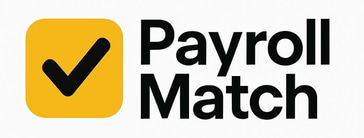Stay Ahead of the Game: Understanding New 401(k) Regulations and the Role of HCM Providers
As the landscape of retirement savings evolves, small and mid-sized business owners are facing a pivotal moment with the upcoming 401(k) regulatory changes set to take effect in 2025. These changes, spearheaded by the Department of Labor, introduce mandatory auto-enrollment, demand detailed fee disclosures, and enforce heightened fiduciary standards for plan sponsors.
Payroll Match
5/1/20254 min read


As the landscape of retirement savings evolves, small and mid-sized business owners are facing a pivotal moment with the upcoming 401(k) regulatory changes set to take effect in 2025. These changes, spearheaded by the Department of Labor, introduce mandatory auto-enrollment, demand detailed fee disclosures, and enforce heightened fiduciary standards for plan sponsors. In response, Human Capital Management (HCM) providers like Paychex, Asure, and OnPay are stepping up to the plate, offering innovative solutions to help businesses navigate these new requirements seamlessly. By enhancing their platforms with features such as auto-enrollment kits, compliance guarantees, and integrated payroll workflows, these providers aim to mitigate compliance risks and safeguard small businesses from potential penalties. Join us as we delve into how these industry leaders are preparing to support business owners in staying ahead of the regulatory curve, as highlighted in Paychex's recent announcement.
Understanding 2025 401(k) Changes
As we approach 2025, significant changes to 401(k) regulations are on the horizon. These reforms will reshape how businesses manage retirement plans for their employees. Let's break down the key aspects of these changes and what they mean for small businesses.
Key 401(k) Reforms Explained
The Department of Labor is introducing sweeping reforms to 401(k) plans, set to take effect in 2025. These changes aim to enhance retirement security for workers across the nation.
Mandatory auto-enrollment is perhaps the most significant change. Employers will be required to automatically enroll eligible employees into 401(k) plans, with the option for employees to opt out if they choose.
Increased transparency is another crucial aspect. Plan sponsors will need to provide detailed fee disclosures and investment information to participants, ensuring they have a clear understanding of their retirement savings options.
Lastly, the reforms include heightened fiduciary standards for plan sponsors. This means employers will have a greater responsibility to act in the best interests of their plan participants, potentially increasing liability for those who fail to meet these standards.
Implications for Small Businesses
For small business owners, these new 401(k) regulations bring both opportunities and challenges. Understanding the implications is crucial for maintaining compliance and supporting employee retirement goals.
The auto-enrollment requirement may lead to increased participation rates in 401(k) plans. While this is positive for employee retirement readiness, it could also mean higher costs for employers who match contributions.
Transparency requirements will necessitate more robust reporting and communication systems. Small businesses may need to invest in new software or services to meet these obligations effectively.
The enhanced fiduciary standards place a greater burden on small business owners to ensure they're making prudent decisions about their 401(k) plans. This might require additional education or the assistance of financial professionals to navigate complex investment choices.
HCM Providers' Role in Compliance
Human Capital Management (HCM) providers are positioning themselves as crucial partners for businesses navigating these new 401(k) regulations. They're developing tools and services specifically designed to address the 2025 changes.
How Paychex Is Handling Compliance
Paychex, a leader in the HCM space, is taking proactive steps to help businesses prepare for the 2025 401(k) changes. Their approach focuses on simplifying compliance and enhancing employee engagement.
The company has introduced auto-enrollment kits that streamline the process of automatically enrolling employees into 401(k) plans. These kits include customizable communications and easy-to-use enrollment forms.
Paychex has also developed new transparency dashboards that provide clear, concise information about plan fees and investment options. These tools help businesses meet the increased disclosure requirements while empowering employees to make informed decisions.
To address the heightened fiduciary standards, Paychex is offering enhanced fiduciary support services. These include regular plan reviews and access to investment professionals who can guide businesses in making prudent decisions for their 401(k) plans.
Asure's Compliance Innovations
Asure, another key player in the HCM industry, is tackling the 2025 401(k) changes with a focus on risk mitigation and peace of mind for business owners.
The company has introduced a compliance guarantee for its 401(k) services. This bold move assures businesses that Asure will take responsibility for any compliance-related issues that may arise, providing a safety net for small business owners.
Asure has also upgraded its reporting tools, offering detailed analytics and customizable reports that make it easy for businesses to meet the new transparency requirements. These tools can generate comprehensive fee disclosures and investment performance reports with just a few clicks.
To support the auto-enrollment mandate, Asure has developed an automated onboarding system that seamlessly integrates new employees into the 401(k) plan while still providing clear opt-out instructions for those who choose not to participate.
OnPay's Integrated Solutions
OnPay is addressing the 2025 401(k) changes by focusing on integration and simplification. Their approach aims to make compliance as seamless as possible for small businesses.
The company has fully integrated 401(k) settings into its payroll workflows. This means that auto-enrollment, contribution changes, and compliance reporting can all be managed within the same system that businesses use for regular payroll processing.
OnPay has also partnered with low-cost fund advisors to offer a curated selection of investment options. This helps businesses meet their fiduciary responsibilities by providing access to well-vetted, cost-effective investment choices for employees.
To support transparency, OnPay has developed employee-facing dashboards that clearly display all relevant 401(k) information, including fees, investment performance, and contribution history. This empowers employees while helping businesses meet disclosure requirements.
Making the Right Choice for Your Business
As the 2025 401(k) changes approach, selecting the right HCM provider becomes increasingly crucial for small businesses. Let's explore how to evaluate your options and mitigate potential risks.
Evaluating HCM Provider Offerings
When choosing an HCM provider to help navigate the new 401(k) regulations, consider the following factors:
Compliance Expertise: Look for providers with a strong track record in regulatory compliance and a clear understanding of the 2025 changes.
Integration Capabilities: Choose a provider whose 401(k) services seamlessly integrate with your existing payroll and HR systems.
User-Friendly Interfaces: Ensure the provider offers intuitive dashboards for both employers and employees to manage 401(k) plans effectively.
Customization Options: Seek providers that allow you to tailor their solutions to your specific business needs and employee demographics.
Support and Training: Evaluate the level of customer support and training resources available to help you navigate the new regulations.
Avoiding Penalties and Legal Risks
To safeguard your business from potential penalties and legal issues related to the new 401(k) regulations, consider these key steps:
Stay Informed: Regularly review updates from the Department of Labor and your HCM provider regarding regulatory changes.
Conduct Regular Audits: Implement a system of regular internal audits to ensure ongoing compliance with the new regulations.
Document Everything: Maintain detailed records of all 401(k)-related decisions, communications, and processes to demonstrate compliance efforts if needed.
Educate Your Team: Ensure that all relevant staff members are trained on the new regulations and your compliance procedures.
Consider Professional Advice: Consult with legal and financial professionals specializing in ERISA law and 401(k) compliance to address complex issues.
By taking these proactive steps and partnering with a capable HCM provider, small businesses can navigate the 2025 401(k) changes with confidence, ensuring compliance while supporting their employees' retirement goals.
Support
Experience
team@payrollmatch.io
(585) 708-7573
© 2025. All rights reserved.
Privacy Policy - https://payrollmatch.io/privacy-policy
Terms and Conditions - https://payrollmatch.io/terms-and-conditions
